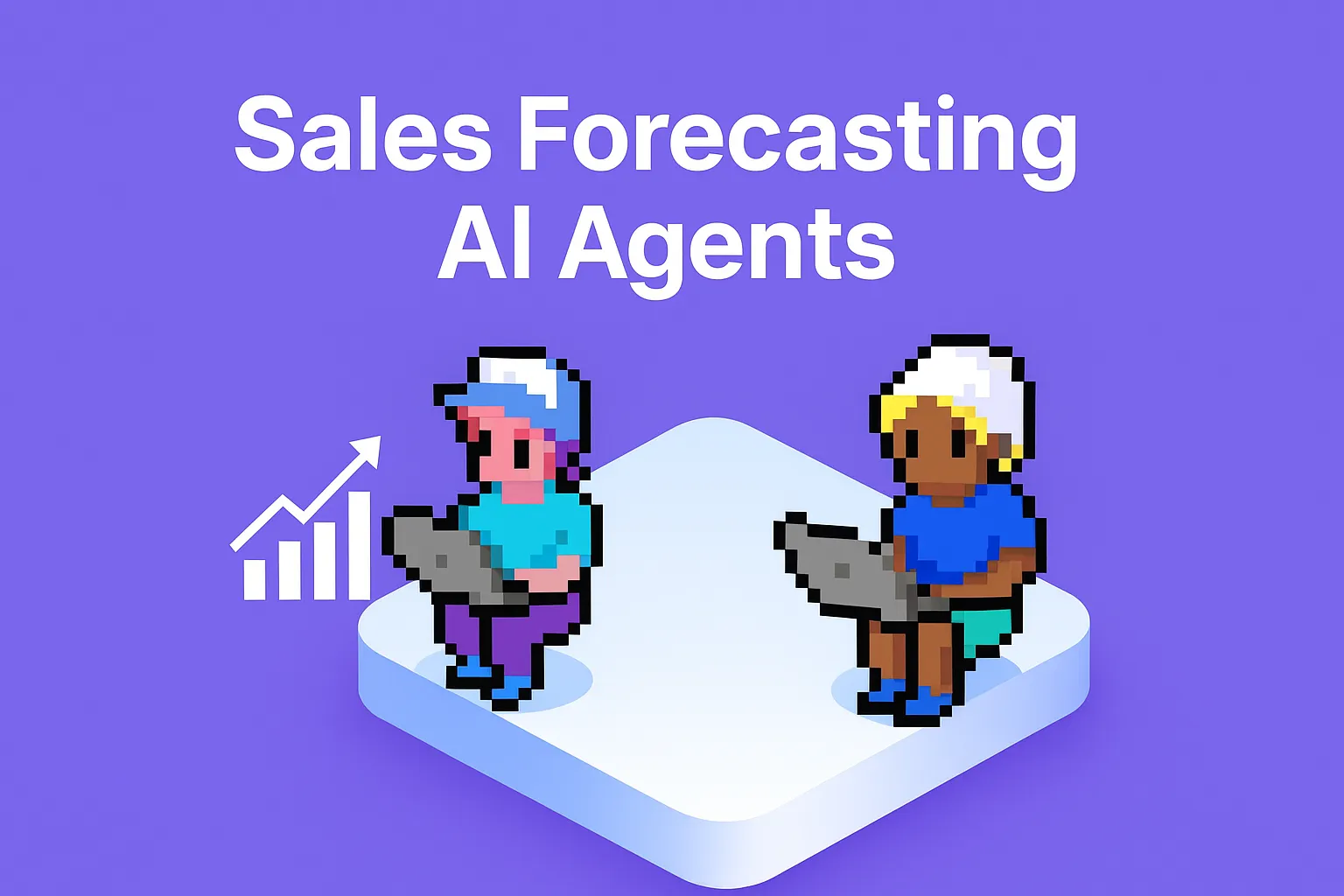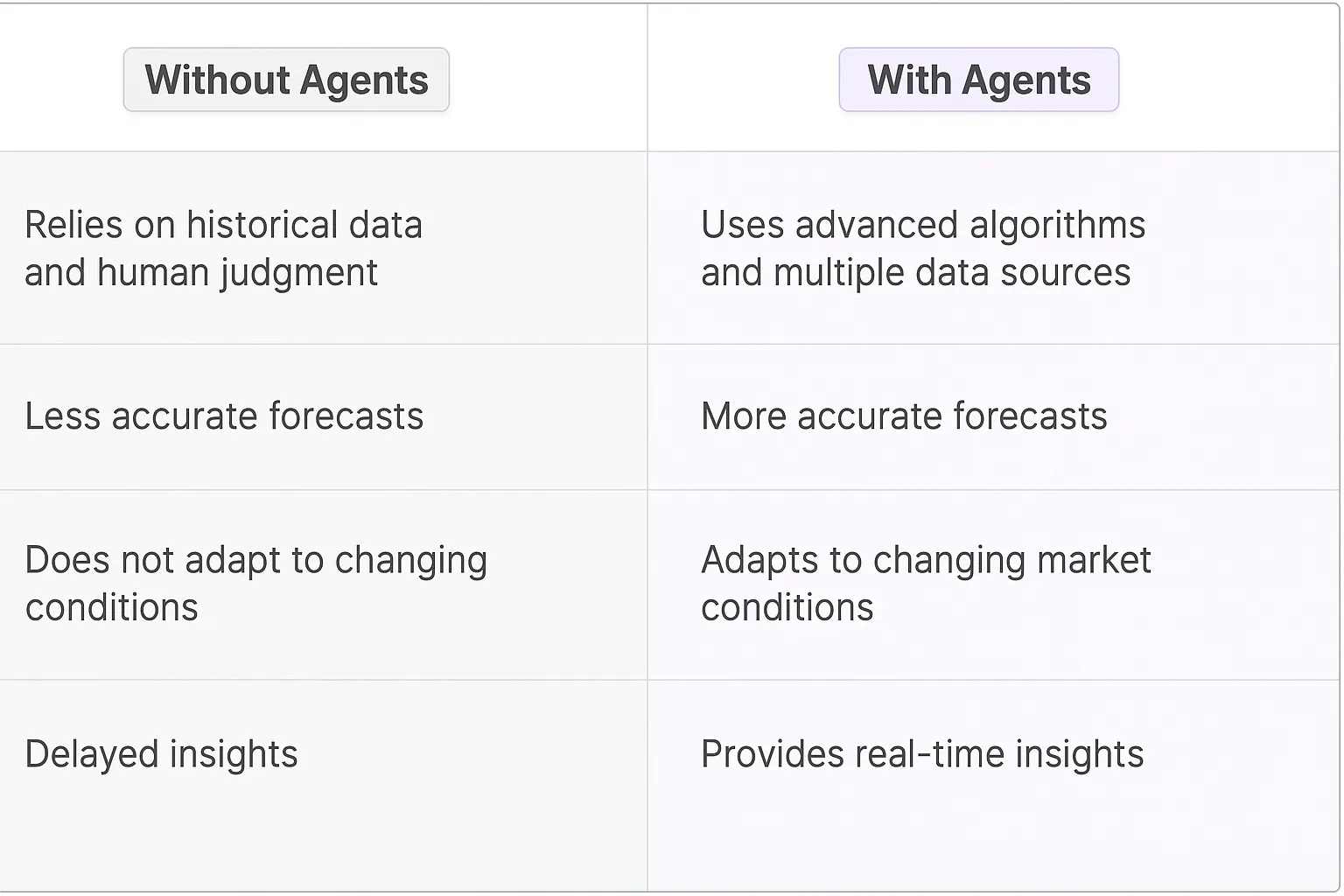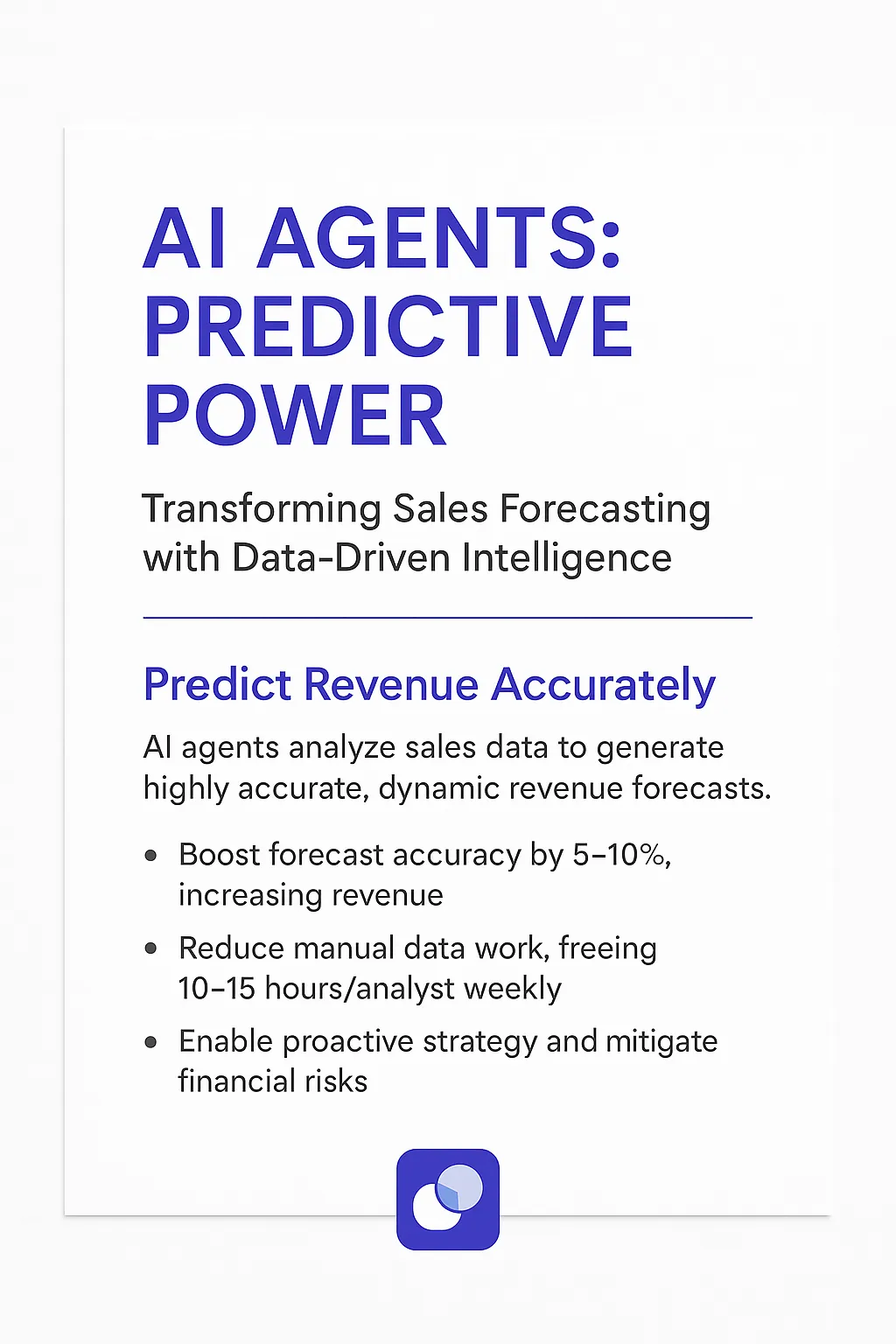Sales Forecasting AI Agents
The Evolution of Sales Forecasting with AI Agents
What is Sales Forecasting?
Sales forecasting is the process of estimating future sales revenue over a specific period. It's a critical business function that informs strategic decisions, resource allocation, and financial planning. Traditionally, sales forecasting relied heavily on historical data and human judgment. However, the advent of AI agents has transformed this process, making it more data-driven, accurate, and responsive to market dynamics.
Key Features of Sales Forecasting AI Agents
- Data Integration: AI agents can process and analyze data from multiple sources, including CRMs, market reports, and economic indicators.
- Pattern Recognition: These digital teammates excel at identifying complex patterns and trends in sales data that humans might overlook.
- Real-time Updates: AI agents continuously update forecasts as new data becomes available, providing a dynamic view of future sales.
- Scenario Modeling: They can quickly run multiple "what-if" scenarios to help businesses understand potential outcomes of different strategies.
- Predictive Analytics: AI agents use machine learning algorithms to make predictions based on historical data and current market conditions.
- Adaptability: These systems learn and improve over time, refining their forecasts as they process more data and outcomes.

Benefits of AI Agents for Sales Forecasting
What would have been used before AI Agents?
Before AI agents entered the scene, sales forecasting was like trying to predict the weather with a wet finger in the air. Companies relied on spreadsheets, gut feelings, and historical data that often failed to capture market dynamics. Sales teams would spend hours in meetings, debating numbers based on intuition rather than solid data. It was a world of educated guesses and crossed fingers.
The old methods were not just time-consuming; they were painfully inaccurate. Think about it: how many times have you seen a sales forecast that was way off the mark? It's like trying to hit a bullseye while blindfolded and spinning. These inaccuracies led to misallocated resources, missed opportunities, and, let's face it, a lot of stress for everyone involved.
What are the benefits of AI Agents?
Enter AI agents for sales forecasting, and suddenly, it's like we've gone from using a sundial to a quantum clock. These digital teammates are game-changers, and here's why:
First off, they're data-hungry beasts. AI agents devour vast amounts of data - historical sales, market trends, customer behavior, economic indicators - you name it. They process this information at a speed and scale that would make even the most caffeinated sales analyst's head spin. The result? Forecasts that are not just educated guesses, but data-driven predictions with a level of accuracy that was previously unthinkable.
But it's not just about crunching numbers. These AI agents are like the Sherlock Holmes of sales data, uncovering hidden patterns and correlations that human eyes might miss. They can spot emerging trends before they become obvious, giving your sales team a crucial edge in a competitive market.
Time is money, and AI agents save buckets of both. Instead of spending hours in forecast meetings, your team can focus on what they do best - selling. The AI handles the heavy lifting of data analysis and prediction, freeing up your human talent to strategize and build relationships.
Perhaps most importantly, AI agents bring a level of objectivity to the forecasting process. They're not swayed by office politics, personal biases, or that extra shot of espresso. This objectivity leads to more reliable forecasts, which in turn leads to better decision-making across the board.
And let's talk about adaptability. Markets change, customer preferences shift, and global events can throw a wrench in the works. AI agents don't just create static forecasts; they continuously learn and adapt. As new data comes in, they refine their predictions, ensuring your forecast stays relevant even as the world around you changes.
In essence, AI agents for sales forecasting are like giving your sales team superpowers. They amplify human intelligence, provide actionable insights, and turn the art of forecasting into a science. It's not about replacing human judgment; it's about enhancing it with data-driven precision. Welcome to the future of sales forecasting - it's smarter, faster, and a whole lot more accurate.

Potential Use Cases of AI Agents for Sales Forecasting
Processes
Sales forecasting AI agents are game-changers for revenue teams. They're not just number crunchers; they're digital teammates that can transform how we predict and plan for future sales. Let's dive into some killer use cases:
- Data Integration and Cleansing: These AI agents can pull data from multiple sources - CRMs, ERPs, market reports - and clean it up faster than any human could. They spot inconsistencies and fill in gaps, giving you a solid foundation for forecasting.
- Pattern Recognition: AI agents excel at identifying complex patterns in historical sales data. They can detect seasonal trends, product lifecycle patterns, and even subtle market shifts that humans might miss.
- Scenario Modeling: Want to know what happens if you double your ad spend or enter a new market? AI agents can run thousands of scenarios in minutes, helping you understand potential outcomes and risks.
- Real-time Forecast Updates: As new data comes in, these agents can continuously update forecasts. No more waiting for end-of-month reports; you get a living, breathing forecast that evolves with your business.
Tasks
Now, let's break it down to specific tasks where AI agents can seriously level up your sales forecasting game:
- Lead Scoring: AI agents can analyze historical data to predict which leads are most likely to convert, helping sales teams prioritize their efforts and improve forecast accuracy.
- Deal Size Prediction: By analyzing factors like company size, industry, and past purchases, AI agents can estimate potential deal sizes, giving you a more granular forecast.
- Sales Cycle Length Estimation: AI agents can predict how long each deal might take to close, helping you time your forecasts and resource allocation more accurately.
- Churn Prediction: These digital teammates can flag accounts at risk of churning, allowing you to factor potential losses into your forecast and take proactive retention measures.
- Market Trend Analysis: AI agents can scrape and analyze vast amounts of market data, incorporating external factors like economic indicators or industry trends into your forecasts.
- Sales Rep Performance Prediction: By analyzing historical performance data, AI agents can forecast individual rep performance, helping managers set realistic targets and identify coaching opportunities.
The beauty of these AI agents is that they're not replacing human judgment; they're enhancing it. They crunch the numbers and spot the patterns, freeing up your team to focus on strategy and relationship-building. It's like giving your sales team a crystal ball, but one that's powered by data and machine learning rather than magic.
As these AI agents evolve, we're going to see sales forecasting shift from a quarterly guessing game to a dynamic, data-driven process that adapts in real-time. The companies that embrace these digital teammates early will have a serious edge in predicting and shaping their financial future. It's not just about better numbers; it's about building a more resilient, responsive sales organization.

Industry Use Cases for Sales Forecasting AI Agents
Sales forecasting AI agents are reshaping how businesses predict future revenue and plan their strategies. These digital teammates bring a level of precision and adaptability that's transforming industries across the board. Let's dive into some specific use cases that showcase how AI is elevating sales forecasting from a guessing game to a data-driven science.
From retail to SaaS, manufacturing to finance, AI agents are crunching numbers, spotting trends, and delivering insights that human analysts might miss. They're not just improving accuracy; they're fundamentally changing how companies approach their sales strategies and resource allocation.
What's particularly exciting is how these AI agents are democratizing advanced forecasting techniques. Small businesses can now leverage predictive models that were once the domain of large corporations with deep pockets. This leveling of the playing field is creating new competitive dynamics and opportunities for innovation in sales strategies.
Let's explore how different sectors are harnessing the power of sales forecasting AI to stay ahead of the curve and drive growth in increasingly complex markets.
Retail Revolution: AI-Powered Sales Forecasting
Let's talk about the retail industry - a sector ripe for AI disruption, especially in sales forecasting. Traditional methods often fall short, leaving retailers with excess inventory or stockouts. Enter AI-powered sales forecasting agents, the unsung heroes of retail's future.
These digital teammates aren't just crunching numbers; they're pattern-recognition ninjas. They dive deep into historical sales data, sure, but that's just the appetizer. The main course? A feast of external factors that human analysts might overlook or struggle to quantify.
Think about it: weather patterns, social media trends, local events, even the latest TikTok challenge - all of these can influence buying behavior. AI agents can process this vast sea of data, identifying correlations and causations that escape the human eye.
But here's where it gets really interesting: these AI agents learn and adapt in real-time. They're not static models; they're living, breathing (okay, metaphorically) entities that evolve with each transaction. Did a surprise heatwave cause a spike in ice cream sales? The AI notes that for next time, adjusting its predictions accordingly.
For retailers, this means a level of precision in inventory management that was previously unthinkable. We're talking about reducing waste, maximizing shelf space, and ensuring that hot items are always in stock. It's not just about predicting sales; it's about orchestrating the entire supply chain like a finely tuned symphony.
The ripple effects are enormous. With more accurate forecasts, retailers can optimize staffing, reduce carrying costs, and even negotiate better terms with suppliers. It's a competitive edge that separates the retail winners from the also-rans.
But let's not forget the customer experience. When stores consistently have what customers want, when they want it, loyalty soars. It's a virtuous cycle: better forecasts lead to happier customers, which leads to more sales data, which leads to even better forecasts.
This isn't some far-off future; it's happening now. The retailers who embrace these AI agents for sales forecasting aren't just playing a different game - they're changing the rules of retail altogether. And in an industry where margins are tight and competition is fierce, that's not just an advantage - it's survival.
Real Estate's AI Crystal Ball: Predicting Property Sales
The real estate market is notoriously unpredictable, but AI agents are changing the game. These digital teammates are transforming how we forecast property sales, and it's not just about historical data anymore.
Think about the complexity of real estate sales. You've got macroeconomic factors, local market conditions, property-specific attributes, and even the fickle nature of buyer preferences. It's a multi-dimensional chess game that even the most seasoned real estate pros struggle to master.
Enter AI-powered sales forecasting agents. These aren't your grandfather's regression models. We're talking about sophisticated machine learning algorithms that can process an insane amount of data points in real-time.
Here's where it gets interesting: these AI agents don't just look at obvious factors like interest rates and local employment stats. They're diving into the deep end, analyzing things like:
- Satellite imagery to track neighborhood development
- Social media sentiment about different areas
- School district performance data
- Crime rate fluctuations
- Even the impact of new coffee shops or yoga studios on property values
But here's the kicker - these AI agents are learning constantly. Every sale, every market shift, every new data point gets factored into their models. They're not just predicting; they're evolving their understanding of the market dynamics in real-time.
For real estate firms, this is a game-changer. Imagine being able to predict which properties will sell fastest, at what price point, and to what demographic. It's not just about making sales; it's about optimizing the entire business model.
You can target your marketing efforts with surgical precision. You can advise clients on the best time to list or buy. You can even predict upcoming "hot" neighborhoods before they blow up.
But let's zoom out for a second. The implications here are huge. We're talking about potentially smoothing out the boom-bust cycles that have defined real estate for decades. By better matching supply with demand, we could see more stable property markets. That's not just good for realtors; it's good for the entire economy.
And for buyers and sellers? This tech could democratize access to high-level market intelligence. No more relying solely on a realtor's "gut feeling" about the market. Everyone gets to play with pro-level data.
We're at the beginning of this revolution, but the potential is mind-boggling. The real estate firms that embrace these AI forecasting agents aren't just going to outperform their competitors; they're going to redefine what it means to be a real estate professional in the 21st century.
This is the future of real estate, folks. And it's not coming - it's already here. The question is, are you ready to ride this wave, or are you going to get left behind in the undertow?
Considerations
Technical Challenges
Implementing a Sales Forecasting AI Agent isn't a walk in the park. It's more like trying to predict the weather in San Francisco - complex, ever-changing, and occasionally foggy. The first hurdle? Data quality. Your AI is only as good as the data it's fed, and sales data can be messier than a startup's first office space.
You'll need to wrangle data from multiple sources - CRMs, spreadsheets, even those Post-it notes your sales reps swear by. Cleaning and normalizing this data is crucial, but it's about as fun as debugging a legacy codebase. Then there's the challenge of choosing the right algorithms. Machine learning models like random forests or neural networks can work wonders, but picking the wrong one is like choosing PHP for your next-gen app - it might work, but you'll regret it later.
Integration with existing systems is another technical minefield. Your shiny new AI needs to play nice with your CRM, ERP, and other acronyms you've invested in. It's like trying to get your smart home devices to communicate - theoretically possible, but prepare for some late nights and colorful language.
Operational Challenges
On the operational front, you're essentially asking your sales team to trust a robot with their commission checks. That's about as popular as suggesting engineers use Windows for development. You'll need a change management strategy more robust than your last product launch.
Training is crucial. Your sales team needs to understand how the AI works - not the nitty-gritty details, but enough to trust its outputs. It's like explaining Bitcoin to your grandparents - you need to find the right balance between accuracy and simplicity.
Then there's the question of how to use the AI's insights. Do you let it influence quotas? Compensation plans? Territory assignments? These decisions can make or break careers, so tread carefully. You're not just implementing tech; you're rewiring your sales org's DNA.
Lastly, don't underestimate the ongoing maintenance. AI models, like pets, need constant attention. They need to be retrained, tweaked, and sometimes completely overhauled as market conditions change. It's a commitment, not a set-it-and-forget-it solution. But get it right, and you'll have a sales forecasting system that's more accurate than your CEO's market predictions - and that's saying something.
Shaping the Future of Sales with AI-Powered Forecasting
AI agents are not just improving sales forecasting; they're redefining it. By harnessing the power of machine learning and big data, these digital teammates are enabling businesses to make more informed decisions, allocate resources more effectively, and stay ahead in competitive markets. The ability to process vast amounts of data, identify subtle patterns, and adapt to changing conditions gives AI-powered forecasting a significant edge over traditional methods.
However, implementing these systems comes with challenges. From ensuring data quality to managing the cultural shift within sales teams, businesses need to approach AI adoption strategically. The payoff, though, can be substantial: more accurate forecasts, better resource allocation, and a more agile response to market changes.
As AI technology continues to evolve, we can expect even more sophisticated forecasting capabilities. The businesses that successfully integrate these AI agents into their sales processes will likely find themselves with a significant competitive advantage. It's not just about predicting the future of sales; it's about shaping it. Welcome to the new era of sales forecasting, where AI and human insight combine to create a powerful force for business growth and innovation.













